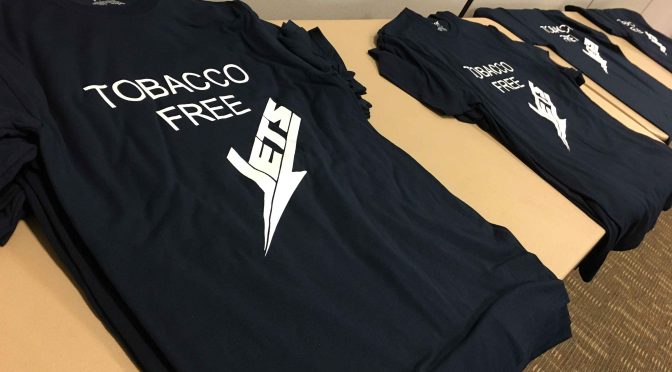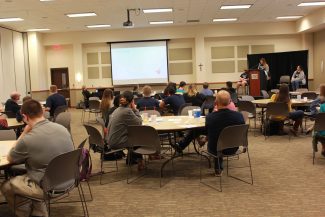The Student Government Association (SGA) hosted a lunch-and-learn with the “Tobacco Free Jets” group on Monday, Nov. 7 in the Dugan-Gorges Conference Center. The event was free and open to the student and faculty body. According to the flyer, the Tobacco Free Jets “is a group of students, who want to ensure a safe and healthy environment for everyone during their time at Newman University.”
SGA Representative Angela de Souza said the luncheon was to help people understand what the initiative is trying to accomplish.
“We don’t want anyone to be upset or confused on what this means for the campus,” she stated.
Before the presentation began, students were curious what the initiative has in store, what it actually means, how it will be enforced, and if there will be a middle ground. Senior Cristal Magdaleno expressed her concern.
“I’m worried about students who already smoke. What will they [Tobacco Free Jets] do about them?”

After lunch, the group held a “tobacco talk” explaining why a tobacco free campus is the right decision for current and future Jets. Beginning the presentation, the group cited tobacco use is the number one cause of preventable death in the United States, and that over 1,000 colleges and universities around the country have adopted a tobacco free policy. The new policy is not meant to persecute or force current users into quitting. The group stated they want to cultivate an environment of mutual respect.
The idea for a tobacco free campus was conceived in 2013 when a survey asked students whether they would like a tobacco free campus or not. According to the survey, the answer was an overwhelming yes. Dean of Students Levi Esses said the Kansas Health Foundation gave Newman a $25,000 grant to enact a healthier campus and achieve the tobacco free initiative.
The right to breathe freely and not experience second-hand smoke goes in conjunction with the university’s three pillars of healthy living: eating healthy, exercising regularly, and maintaining mental and spiritual health.
An important distinction the group wanted to be understood is the difference between a smoke free campus and a tobacco free campus. A tobacco free campus means cigarettes, cigarillos, cigars, roll your own tobacco, e-cigarettes, pipes, and smokeless tobacco including snus and other spitless products will be prohibited on all property owned and leased by Newman University. Wichita State University, Wichita Area Technical College, and Friends University are also implementing a similar plan next July.
The group wanted to ensure that students, faculty, and staff understood the initiative is not “anti-user” but rather focused on promoting health. More employers are supporting tobacco free work environments. Many Newman students will become health professionals, therefore it is important to quit using tobacco products now in order to set an example for patients in the future.
After the presentation, the group opened the floor for questions. One of the main questions on everyone’s mind was whether there will be a designated area for tobacco use on campus. De Souza explained that there will not be a designated area because “We’re looking at Newman as the greater whole for the greater good. We believe this will help more students rather than harm more students. That’s why we are dedicated to finding help for students and faculty who wish to stop smoking.”
Another question was about how faculty, staff and guests will factor into the implementation. Esses answered, “This is all about educating the community and promoting healthier living. We will go to faculty and staff assemblies to listen to their ideas and concerns. And there will be signs posted and guests will be informed of the policy. But because this is student driven we have to see how this will affect students first and foremost. Obviously, there will be concerns, but the focus should be more about healthy living than finding a spot to continue the addiction.”
The question and answer session concluded with addressing the kind of help that will be provided to those wishing to quit. Pamphlets created by the American Association for Respiratory Care, Tobacco-Free Lifestyle Roundtable, and American Respiratory Care Foundation were available that provided information on the benefits of quitting tobacco, explanations of the chemicals in tobacco, the harmful effects, and 10 steps to becoming tobacco free, including the free Kansas tobacco quit line, 1-800-QUIT NOW or KSQuit.org.
The tobacco free campus policy will take effect July 1, 2017.
For more information contact Esses at [email protected] or call 316-942-4291, ext. 2138.


